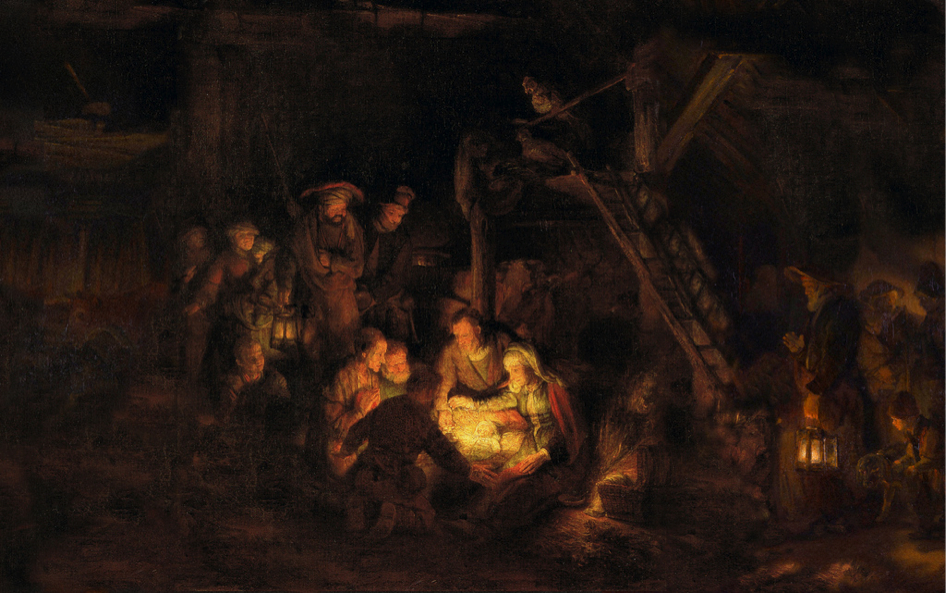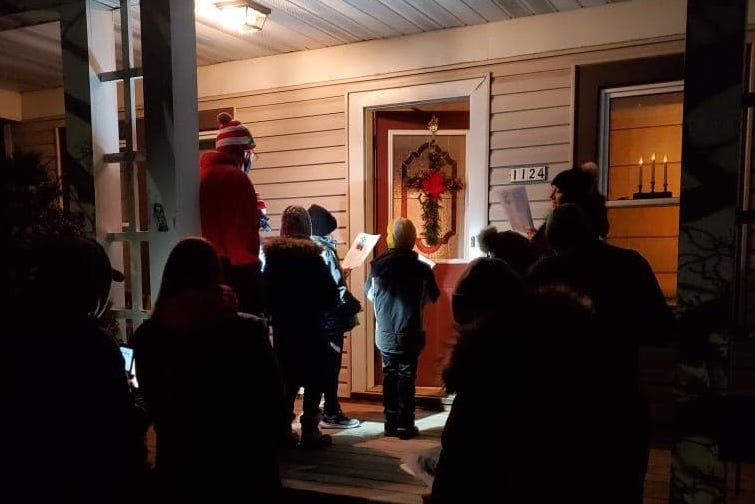
Hey everybody,
It’s Christmas Eve, and you’re reading The Tuesday Pillar Post.
We know the story so well. Mary and Joseph traveled from Nazareth to Galilee to be enrolled according to the dictates of a Roman census. There in the Bethlehem, Mary gave birth to the Lord Jesus.
Luke paints the familiar scene: “She wrapped him in swaddling clothes and laid him in a manger, because there was no room for them in the inn.”
Many biblical scholars, including Sunday School’s Dr. Scott Powell, say that most of us have the wrong idea about all of that. In our nativity scenes, we see Mary and Joseph in a kind of free-standing barn. In the Christmas pageants of our youth, we see the pair going from hotel to hotel, looking for some place to stay, until some innkeeper lets them use his stable.
It wasn’t like that, the scholars say.
Joseph was from Bethlehem. And when he got there, he would have gone to his family home. He would have asked for a place to stay, in the room that gets translated as “inn,” but really should be understood as a place to receive and house guests. He would have expected to be welcomed there.
But Mary and Joseph didn’t get in there. They were relegated to the undercroft of the house, the space where animals lived, and that’s where the baby Jesus was born.
We’re not quite sure why that happened. Maybe it’s because there were relatives from other places staying already in the guest space, who had also come for the census. But consider what that means — those people looked at a relative nine months pregnant, and decided not to give up their place in the house for her.
That only makes sense if Mary and Joseph were being shunned. She was after all pregnant prematurely, in their view, during her betrothal period with Joseph. And maybe his relatives decided not to have that kind of girl in the house.
But whatever was said, or implied, or whatever excuses were made, they weren’t in some barn because of a bureaucratic and logistic snafu — too many visitors and not enough hotel rooms, like they’d gone to the Super Bowl city without prior arrangements.
What happened for them was much more personal — they were down there in some cold space because people they knew, their family, had no space for them.
All of that is how the Son of Man chose to come into the world. In the love of the very first believers — St. Mary and St. Joseph — and outside the embrace of the people closest to them. In the warmth of family love, and the rejection of the world.
“He came to his own people,” St. John’s Gospel wrote, “and his own did not receive him.”
Pope Benedict XVI said this story should be a challenge for all of us.
“Inevitably the question arises,” he wrote, “what would happen if Mary and Joseph were to knock at my door. Would there be room for them?”
“Do we really have room for God when he seeks to enter under our roof? Do we have time and space for him? Do we not actually turn away God himself?” Benedict asked in his Christmas homily of 2012.
Pillar readers: Those questions are for us.
We love the Church. We love her enough to want her holiness, her reform and renewal, her evangelization of the world with the Gospel of Jesus Christ. Many of us have dedicated much of our lives to Christ and his Church.
And still, Benedict asks: “Does God actually have a place in our thinking?”
Do we, his believers and disciples, make room for the Lord? Do we want him in our lives? Do we want to be converted to something deeper and more powerful? Do we want what the Lord will do with us if we give ourselves wholly and entirely to him — if we open the door when Mary and Joseph come knocking?
Or, Benedict asks, do we “want ourselves?”
Too often, he says, “we want what we can seize hold of, we want happiness that is within our reach, we want our plans and purposes to succeed.”
Christmas is a choice for us. An invitation for conversion. Do we want him, or do we “want ourselves”?
“The conversion that we need must truly reach into the depths of our relationship with reality,” Benedict taugh. “Let us ask the Lord that we may become vigilant for his presence, that we may hear how softly yet insistently he knocks at the door of our being and willing. Let us ask that we may make room for him within ourselves, that we may recognize him also in those through whom he speaks to us: children, the suffering, the abandoned, those who are excluded and the poor of this world.”
I hope I’ll open the door. I hope that you will too.
The news
Bishop Erik Varden told The Pillar this week that being alone at Christmas doesn’t have to mean being lonely — and that, indeed, “a solitary Christmas can be a blessing.”
“To embrace the prospect of Christmas alone offers a chance to celebrate the feast contemplatively … the solitary might turn what seems like an indictment into a preferential option, offering their home and their heart as an attentive, well-prepared inn in which the Word will be tenderly welcomed.”
Whether you’ll be alone at Christmas or not, when Bishop Varden gives advice about the interior life, you should listen. And this interview is no exception.
Consider this:
“The English language makes the very useful semantic distinction between loneliness and solitude. Loneliness is a negative condition, one in which I feel deprived of company I want, perhaps ardently yearn for. Solitude, meanwhile, is a state of aloneness enabling me to touch the depths of who I am in order, potentially, there to discover a resonance of the Word in whose image I was made, who desires to become flesh in me, drawing me into the peaceful life of the blessed Trinity, which is communion.”
At St. Francis parish in Manitowoc, Wisconsin, carolers go house-to-house in the Advent season, first singing Christmas carols, and then asking neighbors for prayer intentions, which they text to a group of intercessors praying in adoration, back at their Church.
Elizabeth Gruenke, St. Francis’s youth ministry coordinator and one of the organizers of the event, told The Pillar that neighbors have been very open to sharing their intentions over the years. One man she met this year told her group that he lost his wife two years ago and is feeling lonely this holiday season.
Prayer is efficacious, of course, which means that God is definitely at work through those prayers of the parishioners. And for the carolers, the request for prayer intentions is a way of getting comfortable talking about faith with neighbors — and opening the door, so to speak, to more conversation in the future.
—
—
That decision fits into the ongoing divide in the Chaldean hierarchy, which is split over a number of things, with Iraqi politics figuring prominently in a divide that is now being meted out at the Vatican’s Dicastery for Eastern Catholic Churches.
The 74-year-old bishop, who resigned from office in 2021, faces a total of 33 charges, most of which relate to alleged assaults against three victims between 2008 and 2013, although seven are gun charges, including illegal possession of a weapon.
In April, Saunders’ former secretary told The Pillar she had been ordered by the bishop to make “hush money” payments to the bishop’s alleged victims during her time working for him.
—
Alongside the normal steps taken in the process of beatification and canonization for several men and women, Pope Francis also employed the little-known process of equipollent or “equivalent” canonization for the French Carmelite sisters martyred in the French Revolution.
What on earth is an equipollent canonization? That’s what I wondered when this was announced.
If you wondered too, we’ve got an explainer just for you!
—
Closer to home, Catholics in the U.S. have been outraged this week, after Politico reported Sunday that Seton Hall University’s new president “knew of sex abuse allegations on campus” and failed to follow proper procedures during his time as rector of the archdiocesan seminary attached to the university campus.
If you want to understand the depth of the concern, The Pillar’s explainer breaks down the known facts, the context, and the contention of Msgr. Joseph Reilly’s appointment to lead the Archdiocese of Newark’s Catholic university.
Ed asks a simple question: Is it still 2018 in Newark?
To my way of thinking, the answer is clear. And while Ed documents the ways in which the Archdiocese of Newark seems to have walked back its commitment to accountability in its own leadership structures, I think it’s also worth noting that we’re still not sure the depth of ecclesiastical corruption that enabled Newark’s most famous archbishop — disgraced former cardinal Theodore McCarrick — to gain influence across the Church.
In 2019 — more than five years ago — current Newark archbishop Cardinal Joseph Tobin told me that he was unable to release results of his archdiocesan investigation into McCarrick, or the records of McCarrick’s unmonitored expense accounts, because of a New Jersey attorney general’s investigation into clerical sexual abuse in the state.
That investigation took the form of a task force, launched in 2018 by then-Attorney General Gurbir Grewal.
New Jersey has had three new attorneys general since that task force was launched. But none of them has brought the task force to land, or even answered questions about what investigators are up to — or even whether anyone in the state is actually assigned to task. The Pillar itself has not gotten answers, multiple times, and we’re not the only ones.
To my way of thinking, it looks increasingly like NJ’s attorney general announced a task force when it was politically expedient for state politicians to do so, and then promptly relegated the whole affair to some underfunded back office.
Whatever that means for politicians in the Garden State, a lingering and unresolved investigation has not been helpful for ecclesial reform, or for the serious mission of accountability. In fact, anyone who might have been implicated in archdiocesan records has had more than half a decade without any accountability at all.
And while some might argue that the archdiocese would ensure accountability even without the release of a report, the appointment of Msgr. Reilly to lead Seton Hall would call that into question.
Cardinal Tobin has been praised by some abuse victims for his pastoral kindness to them — in fact, in 2022, the cardinal brought an abuse victim to the USCCB plenary meeting with him, who praised Tobin’s “personal understanding, his humility, his selfless friendship, his merciful embrace of my wounds,” and affirmed that “accountability at all levels is of utmost importance to more fully realize a synodal Church.”
In Newark, accountability is in Tobin’s hands. The cardinal, of course, is unlikely to face questions from Rome about his decision to appoint as a university president a man who was removed as seminary rector, over his failure to properly address sexual misconduct.
But Tobin could answer those questions anyway. And at the same time, he could put aside the “restrictions” of a Potemkin state investigation, and decide that accountability matters more than compliance with a task force that seems to have lost its task.
2025 could be a big year for Tobin. Some have speculated he might even by Archbishop of New York before Easter. But if accountability really is the “utmost importance,” the cardinal seems now to have the chance to show it, regardless of the consequences for himself, or the financial fallout in his archdiocese.
Merry Christmas
Just as soon as I press “send” on this newsletter, The Pillar’s newsrooms will close in Denver, and DC, and the UK, and wherever Edgar is right now.
We’ll be off for the duration of Christmas, returning early January, unless there is some major breaking news that just can’t wait.
This, then, is the moment to thank you for your prayers, your friendship, and your support for our media apostolate. We do this work because we love Christ and the Church — and so we’re edified by how many of you love Jesus Christ so well.
We’ve got a lot to do in the Jubilee Year. There are more stories than we’ve got time even to investigate. But we can talk about that when we get back.
For now, it’s sufficient to wish you a very merry Christmas — not just for one day, but for the whole of Christmas on the calendar.
May it be a season of laughter for you and the people you love.
As Dickens put it, “it is a fair, even-handed, noble adjustment of things, that while there is infection in disease and sorrow, there is nothing in the world so irresistibly contagious as laughter and good humour.”
God bless you, readers. Please be assured of our prayers, and please pray for us. We need it.
Yours in Christ,
JD Flynn
editor-in-chief
The Pillar











New subscriber here because I like all of The Pillar’s work but most recently because I am loving the Sunday School podcast of weekly readings and commentary. Thank you for true journalistic integrity, enlightening commentary, frequent amusement and now you top this all of with a clip from Muppets Christmas Carol?!? Now you officially have a very big fan 🙂 A most blessed Christmas to all of you and may you have rest and joy during this break. God bless you all.
Wow...intro was truly touching and to the point....Ok fair warning JD...I am so stealing parts of it for my Christmas homily...just sayin'....